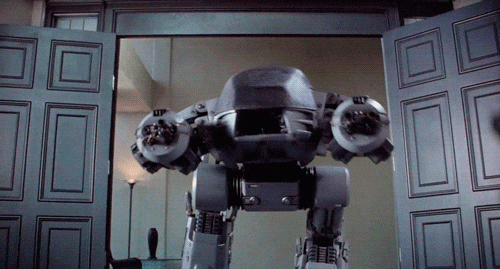KANSAS CITY, Mo. (KCTV) - A sight previously thought to be science fiction is very real at a southeast Kansas City shopping center. Instead of a police officer, a security robot has been patrolling sidewalks and shoppers are taking notice.
Since Marshall the robot has been on the job, shoppers say the experiences have completely changed when they come to these stores. The robot can spend 23 hours a day monitoring the parking lot from all angles which gives people a new sense of protection and ease they don’t always have when out.
Marshall took over security at Brywood Centre in April. Before that, Karen White noticed a lot of trouble outside the shopping center.
“Sometimes it’d be concerning for your car like someone could take it or something,” White said.
Knowing now that Marshall is always watching, the risk of crime does not worry her or others as much.
“It made it very better, like you can’t be in the parking lot without seeing the robot,” White continued. “So, I think it scared them off.”
“He has a license plate reader, he has facial recognition, he can read IP addresses from your cell phone or watch,” Amanda Bellemere, owner of Brywood Shopping Centre, explained. “He knows who you are basically.”
Shoplifter: fuck you police toaster!
Police toaster: you jerk off to incest hentai.
he can read IP addresses from your cell phone or watch
(X) Doubt
They mean the Bluetooth MAC address. It’ll capture your phone’s and can tell who the manufacturer is but the rest of the address is randomized. That said, lots of watches/earbuds/assorted smart Bluetooth things aren’t randomized because manufacturers are lazy.
Depends on what your cell or watch is broadcasting publicly and if you are connected to the store wifi.
Yea, no, the most likely route is to pickup a MAC address and associate it with an existing assigned IP address (If that device is connected to the public WiFi, but who even does that these days lol), but modern day Android and iOS randomize MAC addresses on every connection these days by default.
And then you’d still need to correlate that to the physical world, most likely route would be detecting Bluetooth hostname, but it’s by no means guaranteed that the device hostname in the public WiFi DHCP table matches the BT one (phones can have different names for each). And again is dependent on the person being connected to store WiFi to begin with. Would also be entirely thwarted of a person’s BT is off which is highly likely
It’s possible, but would be a useless feature to develop and maintain as it would probably actually work out in the real world like maybe 30% of the time.
Unless they shoved a full stingray unit in it or something (extremely unlikely), this is just a statement from someone parroting a sales brochure that they didn’t entirely understand
I suspect it works a lot ore than 30%
As you mentioned, cell ID is there too. Pretty easy to simply capture IMSI data (don’t even have to do anything, phones are alway broadcasting their ID).
Combine IMSI, BT, MAC, date/time, and boy you’ve got one helluva surveillance device.
Add in BT headphones, watches, etc, and you have even more data points to associate.
I wouldn’t be shopping there just because of that.
Actually, no. Phones don’t always broadcast their IMSI. Most of the time they broadcast a Temporary Mobile Subscriber Identity (TMSI) and only on a location update (For power conservation). Your cell provider knows your IMSI already and uses a TMSI for updates for the express purpose of privacy and security for these exact scenarios
It is part of the initial work flow of a Stingray device to attempt to force your device to disconnect from the network and get it to rebroadcast its actual IMSI. But it is not floating around in the air all the time and it certainly isn’t trivial to grab.
BT is really the only viable option, and even that can vary wildly depending on manufacturer.
Marshall…?
WHY DIDN’T YOU CALL IT MALL-E?!
WHY?!
They feel like there is less crime, because they have bought into security theater.
Ironically security theater can have a a placebo effect on crime rates as well. It turns out that the likelihood that someone commits a crime is strongly correlated to the chance they believe they will get caught, not the actual chance of getting caught. That’s why fake security cameras are so effective.
“It is not the severity of punishment that deters crime, but the certainty of punishment.”
Bullocks. You could make the crime for stealing death and execute everyone who does. There would still be stealing.
Simply put most criminals don’t think about consequences.
I think you may have misread their comment.
Hate to say it (re: security theater), but I think that is correct. I’ve read articles stating a drop in crime in places where they just have a cardboard cutout of police officers in the window.
It make sense, when you make a decision you make it based on the data you have not the truth. So security theaters are effective as long as people who are thinking about commiting a crime think it is working. And they care about getting caught.
Like the ADT signs people get off of Craigslist.
I’m pretty sure that simply putting a picture of eyes in the scene reduces theft. People are emotional creatures , and if they feel like they’re being watched by someone who doesn’t approve of stealing, they’re more likely to refrain.
“Fifty thousand years ago there were these three guys spread out across the plain and they each heard something rustling in the grass. The first one thought it was a tiger, and he ran like hell, and it was a tiger but the guy got away. The second one thought the rustling was a tiger and he ran like hell, but it was only the wind and his friends all laughed at him for being such a chickenshit. But the third guy thought it was only the wind, so he shrugged it off and the tiger had him for dinner. And the same thing happened a million times across ten thousand generations - and after a while everyone was seeing tigers in the grass even when there weren`t any tigers, because even chickenshits have more kids than corpses do. And from those humble beginnings we learn to see faces in the clouds and portents in the stars, to see agency in randomness, because natural selection favours the paranoid. Even here in the 21st century we can make people more honest just by scribbling a pair of eyes on the wall with a Sharpie. Even now we are wired to believe that unseen things are watching us.”
― Peter Watts, Echopraxia


Closer to this.
I live in Kansas City. Somebody is going to do a drive by on that thing.
So do I, and yes, that could happen.
However, according to the article, it’s been around six months now and is having a positive effect.
The robot can spend 23 hours a day monitoring the parking lot from all angles
Do they get a mandated one-hour break or something?
Charging maybe? A robot’s gotta eat too.
Wouldn’t it make more sense to have removable batteries it could recharge and swap out on the fly?
I mean, maybe that hour is a human swapping batteries and giving it a light cleaning?
TBH, I trust a security robot way, way more than I trust the KCPD at this point.
Our police are state-controlled and don’t seem to give a damn about locals, and they’ve shown themselves to be completely inept to stem the stream of burglaries and theft that’s occurred in the city over the past year. My own car got ripped off less than a year ago, forcing me to have to replace a window, but that’s small potatoes compared to what many others are experiencing.
I’ve made similar points in the past in discussions about robot soldiers going to war. There’s an upside to these things that people insist on overlooking; they follow their programming. If you program a robot soldier to never shoot at an ambulance, then it will never shoot at an ambulance even if it’s having a really bad day. Same here, if the security robot has been programmed never to leave the public sidewalk then it’ll never leave the public sidewalk.
It’s always possible for these sorts of things to be programed to do the wrong things, of course. But at least now we have the ability to audit that sort of thing.
Police don’t prevent crime - their job is the grab people who commit crime.
Prevention is a much more complex issue (cultural).
Even as kids we all did shit our parents told us not to, and we just tried to not get caught.









